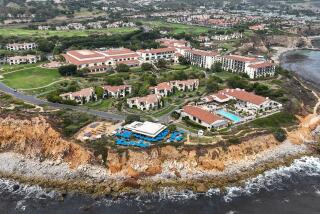Report Ties Teamster Chief to Racketeering : Labor: Overseer of union alleges that McCarthy’s awarding of printing contract to his son-in-law ‘breaches fiduciary responsibility.’
- Share via
WASHINGTON — Teamster President William J. McCarthy on Thursday was accused of racketeering for allegedly awarding $3.8 million in union printing business to a firm owned by his son-in-law and for attempting to obstruct an official investigation of the matter.
The charge was among several leveled in a scathing report to a federal judge by court-appointed union administrator Frederick B. Lacey, who said that McCarthy’s “preferential treatment” of his relative “breaches (his) fiduciary responsibility” to rank-and-file union members.
Lacey said that the firm operated by McCarthy’s son-in-law, Thomas Treacy of Sudbury, Mass., had no printing equipment. He said that the $3.8-million printing contract, the single biggest piece of Teamster business, was symptomatic of “the pervasive nepotism . . . to be found at every level of the International Brotherhood of Teamsters and its affiliates.”
While Lacey’s accusation does not constitute a criminal charge, his report to U.S. District Judge David N. Edelstein of New York suggested that the Justice Department may want to investigate whether McCarthy’s actions violate federal labor laws.
The charges marked the most serious rebuke of any Teamster official since Edelstein appointed Lacey, an attorney and former federal judge, in May, 1989, to oversee the day-to-day affairs of the 1.6-million-member union, the nation’s largest.
Lacey and two other lawyers were assigned by the judge to try to rid the union of corruption to settle a massive anti-racketeering lawsuit filed by the government. Next year, under court supervision, union members will vote by secret ballot for the first time to elect a new president and other officers.
McCarthy, who was appointed by the union’s executive board in July, 1988, to succeed the late Jackie Presser, has announced that he will not seek reelection.
A spokesman for McCarthy did not respond to a request for comment on Lacey’s report. Previously, a Teamster official had said that the printing work by Treacy’s firm had saved money for the union, but he declined to answer questions about it.
Lacey’s report said that a yearlong investigation by his auditors had determined that Treacy was given the business of printing the union’s monthly magazine without signing a formal contract. The work was awarded to him after McCarthy solicited bids from Treacy’s newly formed firm, Windsor Graphics, and two other designated companies, Lacey said.
The bidding process was “flawed” and constituted “a charade, nothing more,” the report charged. No specifications were prepared and none of the bids were sealed. In fact, Treacy’s firm got “inside help” from McCarthy’s aides involving how its bid should be “amended,” the report said.
While the cost of printing the magazine may have been less than in previous years, Windsor Graphics realized a profit of about $250,000 a year by farming out all the work, Lacey said. He said that the company, which operated out of the basement of Treacy’s home, also was advanced more than $1.3 million in Teamster funds to pay for paper and printing.
The extraordinary “cash advance” kept the union from earning interest on these funds and resulted in abnormally higher costs, the report said.
The report said that Lacey was vetoing further expenditures to Treacy and that outside lawyers hired by the Teamsters had agreed to discuss submitting the union’s printing work to bids again.
During the investigation, McCarthy and James T. Grady, the union’s general counsel, “obstructed our efforts to conduct this investigation” by attempting to dissuade a witness from being interviewed, Lacey said. When the witness, a businessman, cooperated with investigators, the union rescinded a large piece of his Teamster business, he added.
Teamster officials also employed other “petty” tactics, including denying Lacey’s auditors--who had an office in Teamster headquarters--access to a snack bar across the hall, the report said.
Justice Department spokesman Doug Tillet, when asked about Lacey’s suggestion of a further investigation, said that the agency is “in close contact with his work,” but he declined further comment.
However, the FBI undertook a preliminary investigation last year to determine whether the McCarthy-Treacy arrangement constituted embezzlement under the Labor Management Reporting and Disclosure Act, a source familiar with the matter said.
Information from the FBI investigation subsequently was relayed to Lacey on the theory that he could act more quickly to counter the alleged self-dealing than if a full criminal investigation were launched.


